If you’re using both the Meta Pixel and the Conversions API (CAPI) — as Meta recommends — your purchase data might look inflated, duplicated, or inconsistent across campaigns. And in many cases, merchants don’t even realize it.
This happens because Facebook doesn’t automatically know that a browser-side purchase and a server-side purchase are the same event — unless you set up something called event deduplication.
Done correctly, deduplication ensures you track one clean purchase per customer.
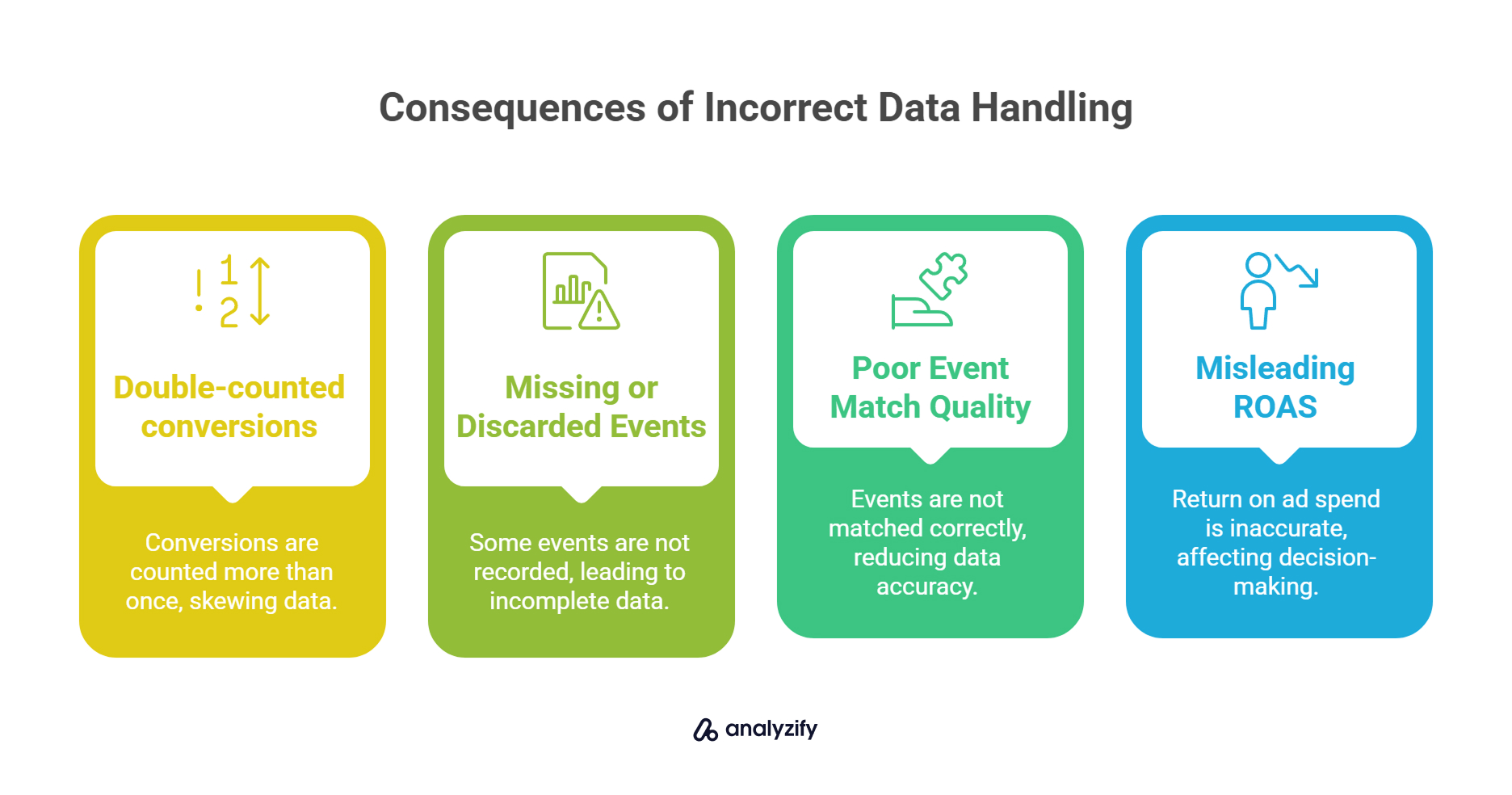
Done incorrectly it can lead to:
Double-counted conversions
Missing or discarded events
Poor Event Match Quality (EMQ)
Misleading ROAS and reporting
In this article, we’ll explain:
What event deduplication is
Why it’s essential for Meta tracking on Shopify
How to implement event deduplication properly (or how Analyzify handles it automatically)
Let’s start by breaking down the core concept.
What Is Event Deduplication in Meta Tracking?
Event deduplication is Meta’s way of making sure a single conversion is only counted once — even if it’s received through multiple tracking channels.
Most Shopify stores now use both:
Meta Pixel (client-side) — triggered in the customer’s browser
Meta CAPI (server-side) — triggered by your backend or through a platform like Analyzify
![]()
When both are active, Meta receives two versions of the same event — one from the browser and one from the server.
Without proper deduplication, Meta might:
Double count the event (inflating results), or
Discard one entirely (especially the server-side one)
Deduplication works by using a shared identifier — the event_id — sent with both versions of the event. If Meta receives two events with the same name, same timestamp, and same event_id, it knows they’re duplicates and keeps only one.
This process isn’t optional. It’s the only way Meta can match up hybrid tracking setups accurately — and the only way to trust your conversion data.
👉 Learn how Analyzify can help you with Shopify and Facebook Pixel integration so you can get richer insights into your campaigns effortlessly.
Why Deduplication Is Required in a Hybrid Setup (Pixel + CAPI)
Meta encourages businesses to use both browser and server tracking together — and for good reason. This hybrid setup improves data reliability across devices, browsers, and privacy restrictions. But it also introduces a new responsibility: making sure those two tracking methods don’t report the same event twice.
![]()
Here’s what actually happens:
The Meta Pixel fires in the browser when a user completes an action (like a purchase).
The Conversions API (CAPI) sends the same action from your server — often with richer data like customer info, UTM parameters, or product metadata.
Meta receives both versions, sometimes milliseconds apart — but it treats them as two separate events unless they share a matching event_id.
Without that identifier, Meta has no reliable way to tell the two apart.
This is especially critical for high-impact events like:
Purchase
AddToCart
InitiateCheckout
Lead
 Built for Shopify - No Dev Work Required - Fast Setup
Built for Shopify - No Dev Work Required - Fast Setup 
Missing Conversions in GA4 or Meta Ads?
Standart browsing tracking misses conversions - Analyzify adds Server-side tracking for accurate GA4 & Meta reports.For Shopify stores using server-side tools like Analyzify, this means ensuring the exact same event_id is sent with both the browser and server versions of each key event. That’s how Meta knows to count it once — not twice, and not zero.
How Meta Handles Deduplication: What You Need to Send
Meta doesn’t guess when it decides whether two events are duplicates. It relies on a specific set of conditions — and the most critical one is the event_id.
To ensure proper deduplication, both the Meta Pixel (client-side) and the Conversions API (server-side) must send the same event_id for each conversion event.
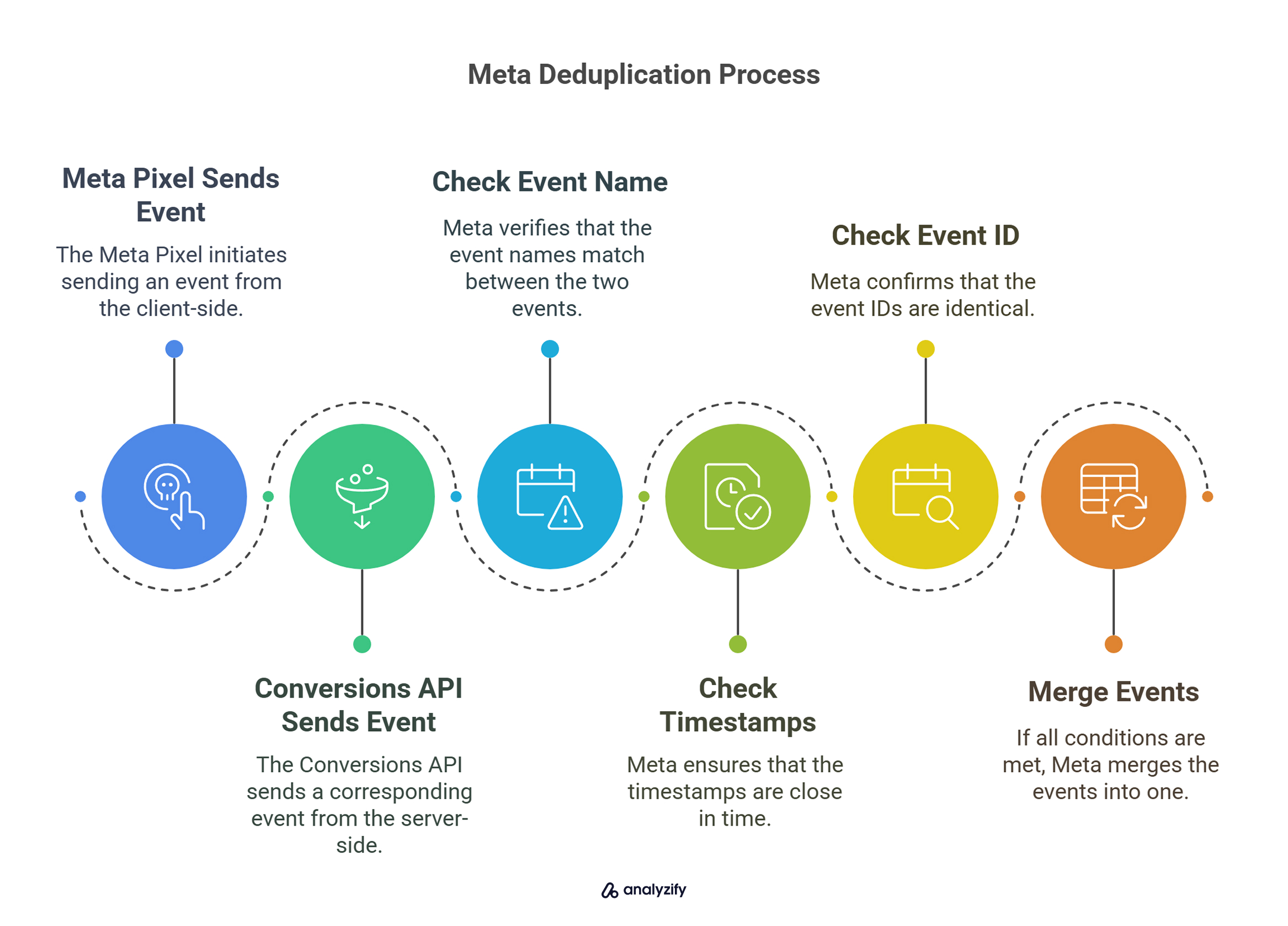
Meta then checks the following:
The event name must be the same (e.g., Purchase, AddToCart).
The timestamps should be close — ideally within milliseconds or seconds.
The event_id must match exactly between the browser and server version.
When all three conditions are met, Meta merges the two events and counts only one.
Here’s an example:
A user places an order. The Pixel sends a Purchase event with event_id: abc123. Moments later, your server sends the same Purchase event — also with event_id: abc123. Meta recognizes them as duplicates and logs a single conversion.
But if the event IDs are missing or mismatched, things break down. Meta might:
Count the same conversion twice — inflating your results
Discard one version — often the server-side event
Lower your Event Match Quality (EMQ) score — reducing optimization effectiveness
👉 Discover how to boost your Meta Event Match Quality and get better results from your Facebook and Instagram ads.
Common Mistakes That Break Deduplication
Even when merchants understand that deduplication is necessary, the actual setup often contains small errors that cause Meta to misfire — either double-counting conversions or failing to track them at all.
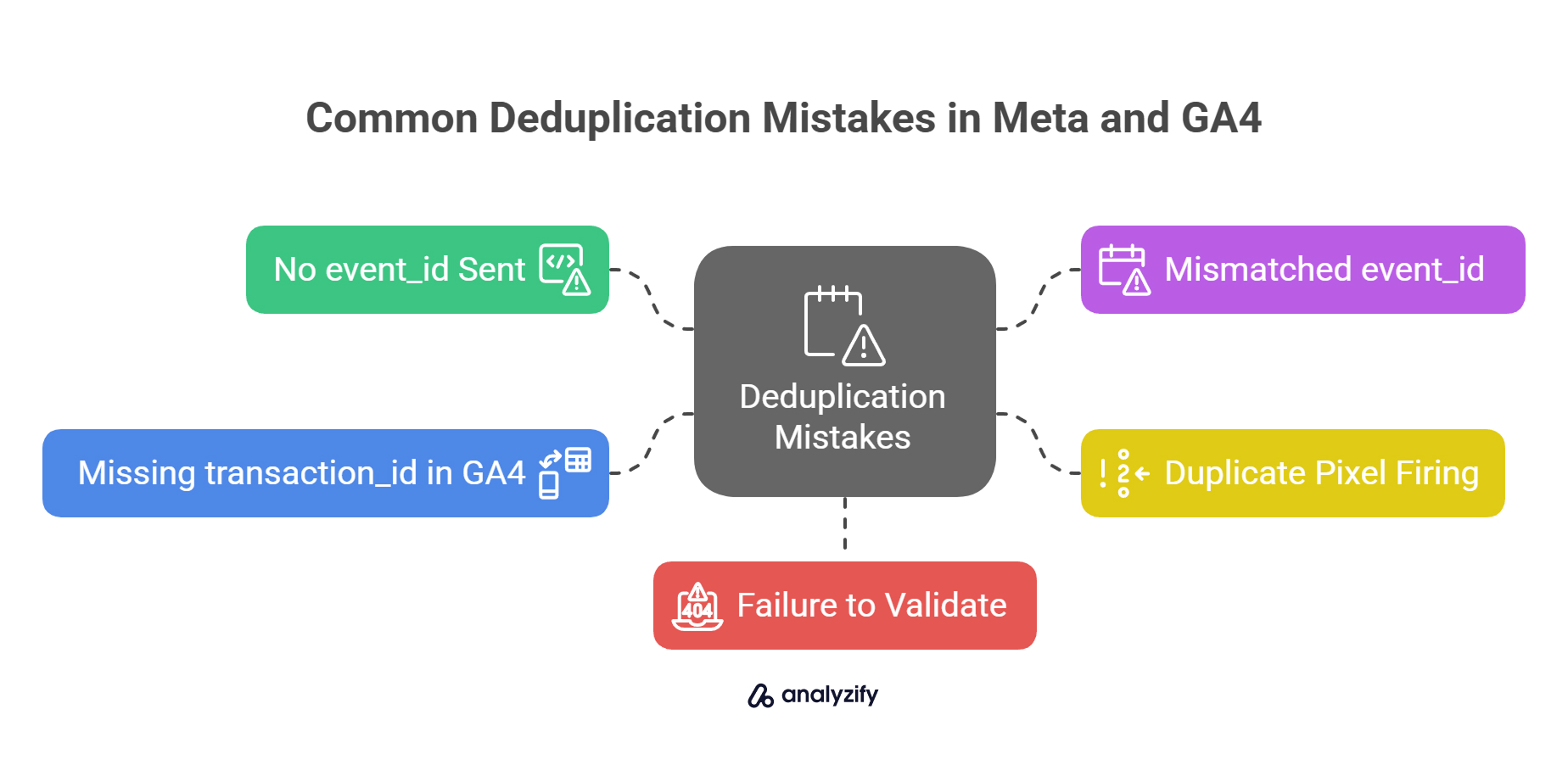
Here are the most common implementation issues:
1. No event_id Sent at All
Some setups send Pixel and CAPI events independently without including the event_id — or they include it on one but not the other. Without this shared identifier, Meta has no way to match the events.
2. Mismatched event_id Between Browser and Server
Even a small difference — like an extra character, random ID generation, or timing mismatch — can prevent Meta from linking the events. The IDs must be identical for the same event.
3. Duplicate Pixel Firing
In some themes or Shopify apps, the Pixel may fire twice from the browser — once from the default integration, and once from a custom script. This creates an inflated baseline before the server event is even considered.
4. Missing transaction_id in GA4 (Bonus Context)
While not a Meta issue, this is a similar mistake seen in GA4 setups — using server-side and client-side purchase events without aligning transaction_id, which breaks deduplication there too.
5. Failure to Validate in Meta Events Manager
Many merchants assume everything works once events are firing, but they don’t check the Meta Events Manager. This tool shows whether events are being deduplicated properly — or not at all.
 Built for Shopify - No Dev Work Required - Fast Setup
Built for Shopify - No Dev Work Required - Fast Setup 
Standart Tracking Methods Aren't Enough for Shopify
Let Analyzify combine client-side and server-side tracking. So you capture every important event, even when browser script fail.How Analyzify Automatically Handles Event Deduplication
Setting up deduplication manually can be complex — especially on Shopify, where Pixel and CAPI events may originate from different places, with different IDs and timing. Even small inconsistencies can lead to unreliable data and hours spent inside Meta Events Manager.
Analyzify solves this by managing the entire process automatically. There’s no need for merchants to write scripts, generate event IDs, or coordinate browser and server logic.
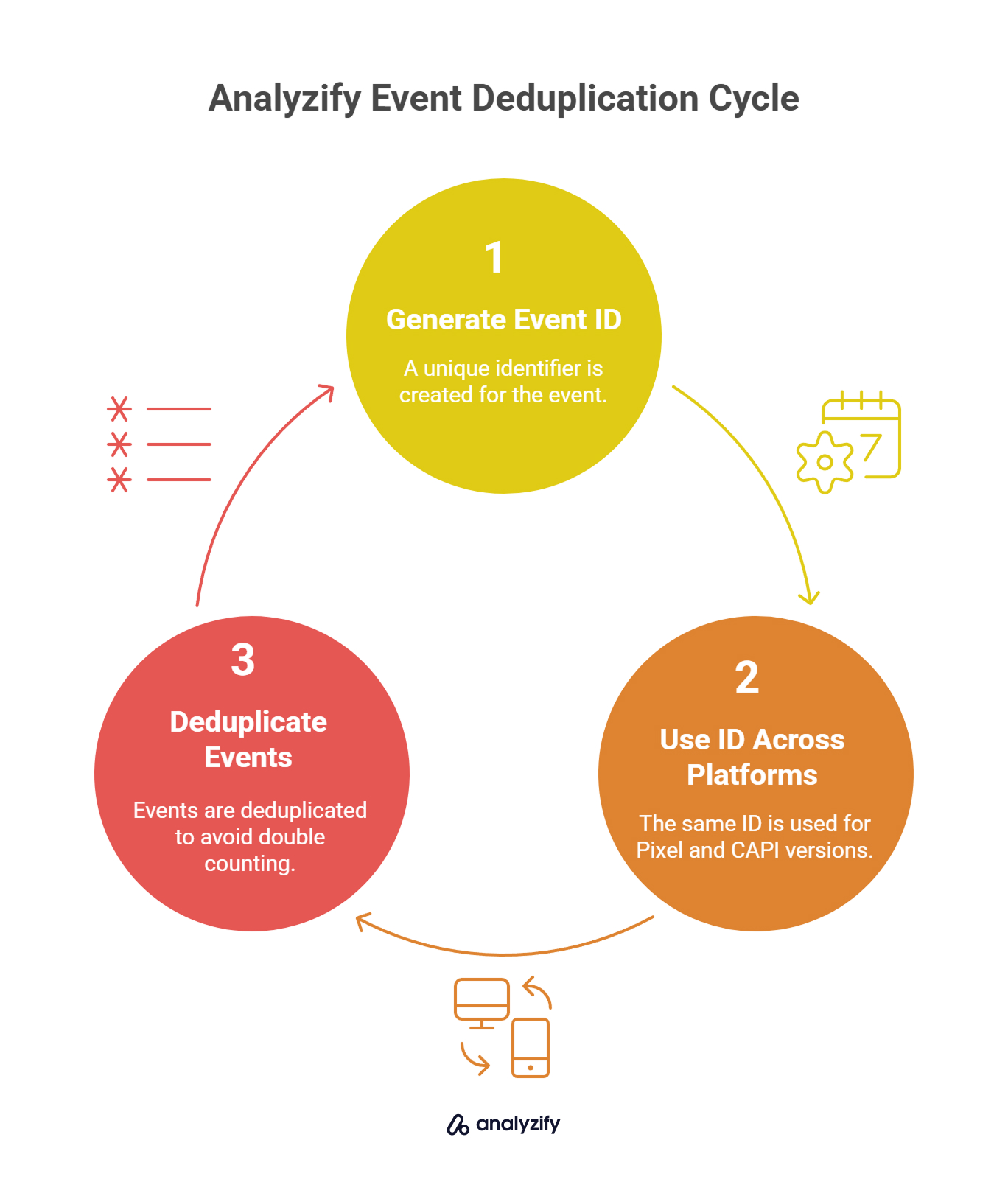
Here’s how it works:
Analyzify generates a unique event_id when a key event (like Purchase) is triggered.
That same ID is used across both the Pixel and CAPI versions of the event.
The structure and delivery follow Meta’s deduplication guidelines exactly — so the event is counted once, not twice.
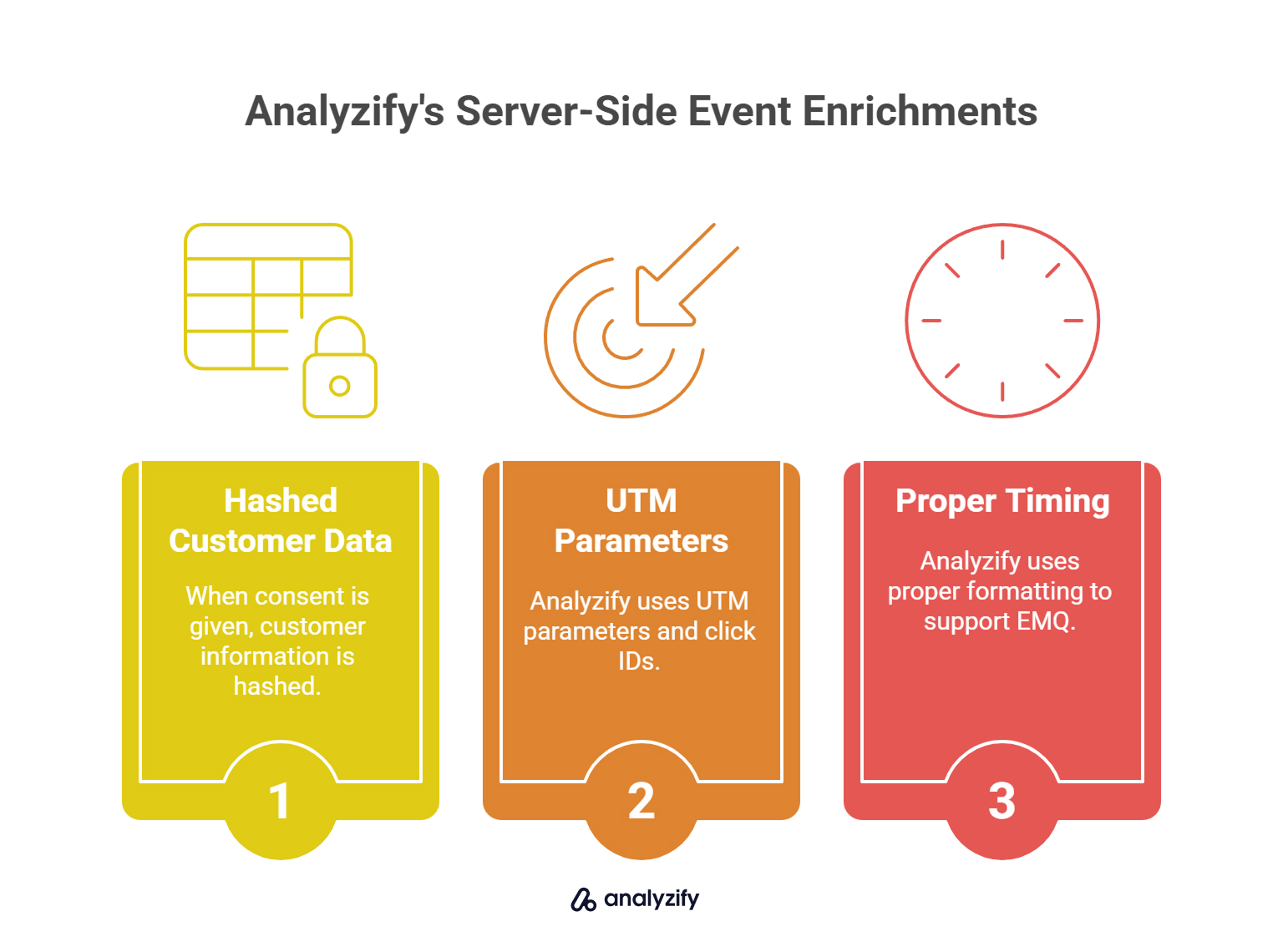
👉 Compare Analyzify with Shopify’s native Meta setup to see which delivers more accurate tracking and higher ad performance.
Behind the scenes, Analyzify also enriches server-side events with:
Hashed customer data (when consent is granted)
UTM parameters and click IDs for attribution
Proper timing and formatting to support Event Match Quality (EMQ)
Achieve Data Confidence and Get the Help You Need When It Matters.
This ensures your Meta conversions are both accurate and complete — with no extra configuration required.
Final Thoughts: Clean Data Starts with the Right Setup
Using both the Meta Pixel and the Conversions API is no longer optional — it’s the standard for accurate conversion tracking. But without proper deduplication, running both can create more problems than it solves.
Facebook’s deduplication system is simple in theory — but easy to misconfigure in practice. A single missing or mismatched event_id can throw off your reporting, inflate purchases, or drop key conversions altogether.
That’s why it’s not just about using server-side tracking — it’s about setting it up correctly.
If you’re using Analyzify, you don’t need to manage these technical details. Our system automatically handles event ID generation, synchronization, and delivery across Pixel and CAPI — so your Meta reports reflect clean, deduplicated data you can trust.
Bonus: Explore our comprehensive Shopify Server-Side Tracking Guidebook covering implementation strategies, first-party data, and solutions for all tracking limitations.
Want to Make Sure Your Meta Tracking Is Actually Accurate?
Analyzify takes care of Meta deduplication and hybrid tracking for Shopify — so you don’t have to worry about double events, missing conversions, or broken campaign data.
Explore how Analyzify ensures clean, reliable purchase tracking across Pixel and CAPI.
 Built for Shopify - No Dev Work Required - Fast Setup
Built for Shopify - No Dev Work Required - Fast Setup 
Start Tracking Shopify Orders Accurately!
Let Analyzify's enhanced server-side tracking provide you with more accurate & reliable attribution data - setup in 10-15 minutes.































